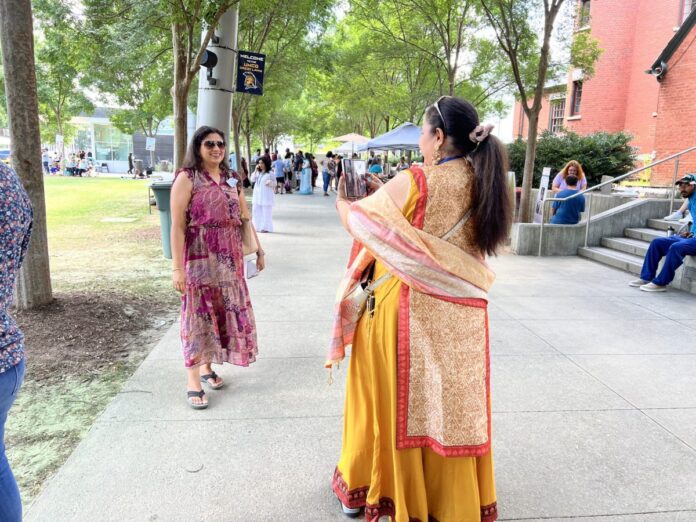For eight minutes, as attendees quieted their voices and listened to the two children on stage recite the ancient phrases, vedic chanting reverberated through the air at LeBauer Park.
A nearly 3,000 year old oral tradition, vedic chanting was just one of the many Indian cultural experiences offered at the annual Experience India event on June 22.
“We have been doing bigger events like this for the last 10-15 years,” said Amrish Soni, director of media relations for the India Association of the Triad, the organization that coordinates the festival.
Founded in 2002, the India Association of the Triad’s primary mission is to create awareness about the rich cultural heritage of India in the Triad, according to their website.
India is one of eight countries considered part of South Asia which includes other countries like Bangladesh, Nepal, Bhutan and Afghanistan. Indian Americans make up the largest ethnic group of South Asians in North Carolina, according to Indian American Impact.
After the chanting quieted down, Soni took the stage to give the chanters their flowers.
“Learning this skill is not easy. We should appreciate them with thunderous, loud applause for giving us an auspicious opening for our event,” Soni said. “They are just 11 and 13 years old. Imagine, and this was Sanskrit, which is very difficult to learn.”
Throughout the park, posters with information about the capitals, languages spoken, population, cultural facts, and the traditional foods about states in India hung from the trees. One poster highlighted the western coast state of Gujarat which boasts a population more than 60 million and has the highest number of operating airports at 17 active airports.
“They represent something unique about each state,” Soni said, of the posters. “In India if you move from state to state, the language changes, the food changes, the dressing sense changes.”
Many of these changes could be seen and experienced at the event.
As vendors and organizers set up, the song “Saturday Saturday” filled downtown Greensboro from the film Humpty Sharma Ki Dulhania, a 2014 Indian romantic comedy. Celebrated as the “the party song of all party songs” in some corners of the internet, the upbeat song’s club thumping rhythm acted as the soundtrack for the event.
During the minutes leading up to the festival, vendors carefully set up their stations and tables. One vendor laid out a black tablecloth and carefully placed bracelets, necklaces, and earrings across a table. The silver and multi-colored bracelets stood out and shined extra as the green, red, and light purple jewels of one bracelet caught the sun.
Arpita Banik and Pinkey Halder of Deshi Elegance in USA sold colorful sarees made from silk and cotton at their booth.
“It is traditional attire,” Halder explained. “It is a fabric or attire that makes a woman or a girl beautiful in an aesthetic way.”
Draped over white hangers and hung on a rolling clothing rack, the saree displayed visible line patterns or ornate brightly colored trim. One gold piece, which appeared plain on quick glance, displayed details of sprouting leaves and blooming flowers in a slightly darker golden color upon closer inspection.
Nearby, a vendor sold golden fried pastries known as samosas. Neatly placed on the bottom of an aluminum tray, the samosas beckoned patrons with the smell of cooked lentils, potatoes, minced vegetables and aromatic spices. A kick of heat greeted anyone who gladly consumed them.
Deshi Bites offered hungry patrons kheer — a rice pudding served as dessert at festivals such as religious events or weddings — and chai. Owner Sabiha Sharmin Shammii, who hails from Bangladesh, said that the Experience India event allowed her to present her food publicly for the first time.
“Chai means tea and is a part of our culture,” Shammi explained. “We can’t even think of breakfast without or even no party is over without a cup of tea. It makes you feel fresh in the morning.”
Despite the nearly 90 degree weather and standing under a sun that could easily fry an egg, customers lined up to get cups of the spiced drink. Under the shade of a tree, the chai was a welcome respite.
Join the First Amendment Society, a membership that goes directly to funding TCB‘s newsroom.
We believe that reporting can save the world.
The TCB First Amendment Society recognizes the vital role of a free, unfettered press with a bundling of local experiences designed to build community, and unique engagements with our newsroom that will help you understand, and shape, local journalism’s critical role in uplifting the people in our cities.
All revenue goes directly into the newsroom as reporters’ salaries and freelance commissions.
